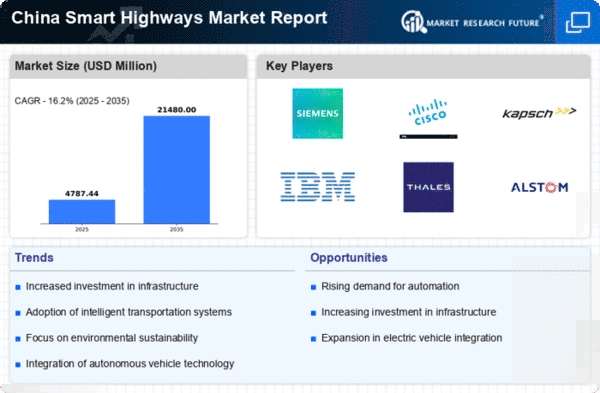Government Initiatives and Funding
The Chinese government actively promotes the development of smart highways through various initiatives and funding programs. With an investment of over $100 billion in infrastructure projects, the government aims to enhance transportation efficiency and safety. This financial backing is crucial for the smart highways market, as it facilitates the integration of advanced technologies such as intelligent traffic management systems and vehicle-to-infrastructure communication. The government's commitment to improving road networks is expected to drive the smart highways market, as it aligns with national goals for urbanization and economic growth. Furthermore, policies aimed at reducing traffic congestion and emissions are likely to bolster the adoption of smart highway solutions, making this a pivotal driver in the market landscape.
Public Safety and Traffic Management Needs
Public safety remains a paramount concern in China's transportation landscape, influencing the smart highways market significantly. With road traffic accidents being a leading cause of fatalities, there is a pressing need for advanced traffic management solutions. Smart highways can enhance safety through features like automated incident detection and real-time alerts to drivers. The market is expected to grow as municipalities invest in technologies that improve road safety and reduce accident rates. Furthermore, the integration of smart surveillance systems and data analytics can provide valuable insights for law enforcement and traffic management agencies, thereby reinforcing the importance of safety in the development of smart highways.
Rising Urbanization and Population Density
China's rapid urbanization, with over 60% of its population now residing in urban areas, significantly impacts the smart highways market. As cities expand, the demand for efficient transportation systems increases, necessitating the implementation of smart highway technologies. Urban areas face challenges such as traffic congestion and pollution, which smart highways can address through real-time traffic management and optimized routing. The smart highways market is projected to grow as urban planners and policymakers seek innovative solutions to manage the increasing number of vehicles on the road. This trend indicates a strong potential for smart highway investments, as they promise to enhance mobility and reduce environmental impacts in densely populated regions.
Technological Advancements in Transportation
The continuous evolution of technology plays a crucial role in shaping the smart highways market. Innovations in artificial intelligence, big data analytics, and machine learning are transforming how transportation systems operate. In China, the integration of these technologies into highway infrastructure is expected to enhance traffic flow and safety. For instance, AI-driven traffic management systems can analyze real-time data to optimize traffic signals and reduce congestion. The smart highways market is likely to benefit from these advancements, as they provide the tools necessary for creating more responsive and efficient transportation networks. As technology continues to advance, the potential for improved highway systems becomes increasingly apparent.
Environmental Concerns and Sustainability Goals
Growing environmental concerns in China are driving the smart highways market towards more sustainable practices. The government has set ambitious targets to reduce carbon emissions by 40-45% by 2025, which necessitates the adoption of eco-friendly transportation solutions. Smart highways can contribute to these goals by promoting electric vehicle usage and reducing traffic congestion, thereby lowering emissions. The market is likely to see increased investment in technologies that support sustainable transportation, such as smart charging stations and energy-efficient traffic management systems. This alignment with environmental objectives positions the smart highways market as a key player in China's broader sustainability agenda.
















